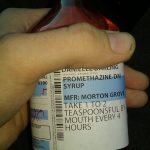How to Take Phenergan (Promethazine) For Sleep

The collective term sleep disorder refers to conditions that affect sleep quality, timing, or duration and impact a person’s ability to properly function while they are awake. These disorders can contribute to other medical problems, and some may also be symptoms of underlying mental health issues.
Data indicate that more than one-third of adults in the United States report getting fewer than 7 hours of sleep in a 24-hour period. More than 70 percent of high school students report getting fewer than 8 hours of sleep on weeknights.
Most people occasionally experience sleeping problems due to stress, hectic schedules, and other outside influences. However, when these issues begin to occur on a regular basis and interfere with daily life, they may indicate a sleeping disorder.
Depending on the type of sleep disorder, people may have a difficult time falling asleep and may feel extremely tired throughout the day. The lack of sleep can have a negative impact on energy, mood, concentration, and overall health.
What is Phenergan (promethazine)?
Phenergan is a brand of promethazine, a medication used to treat several conditions, including allergies, motion sickness, nausea and vomiting, anxiety before surgery, and pain after surgery. It’s also used as a sleep aid, including before and after surgery.
This drug may be used as part of a combination therapy. That means you may need to take it with other medications. Phenergan comes as an oral tablet, an oral solution, an injectable solution, and a rectal suppository.
Phenergan oral tablet is only available as a generic drug. Generic drugs usually cost less than brand-name versions. It is also known by the trade name Sominex.
How it works
Phenergan (promethazine) belongs to a class of drugs called phenothiazines. A class of drugs is a group of medications that work in a similar way. These drugs are often used to treat similar conditions.
Phenergan (promethazine) works by preventing the release of a substance called histamine from certain cells in your body. Histamine is normally released when you’re exposed to things you’re allergic to, such as pollen, dander, mold, or chemicals.
By preventing the release of histamine, this drug causes sleepiness and helps with pain control. This is because histamine helps regulate wakefulness and helps to keep you alert and your senses heightened.
This drug also works to reduce stimulation of the part of your brain that sends signals to make you vomit.
Can I take Phenergan (promethazine) for sleep?
Yes, you can take Phenergan (promethazine) for sleeping problems at bedtime, it will help you sleep better because it enters the brain in large quantities which makes you feel drowsy. If your sleeping problems are caused by anxiety, Phenergan (promethazine) can also be useful if taken at bedtime because it can also relieve anxiety and produce quiet sleep.
However, Phenergan (promethazine) can make you feel very sleepy and affect your ability to drive and do activities that require concentration. Taking other medications that make you sleepy, like sedatives and certain antidepressants, and drinking alcohol can worsen this side effect.
How long does it take for the effects of Phenergan (promethazine) to kick in?
When you take Phenergan (promethazine) for sleep, it starts working almost immediately after you take it, you should begin to feel sleepy within 20 minutes of taking the medication and it may work for up to 12 hours.
How many mg of Phenergan (promethazine) should I take to sleep?
For insomnia, doctors generally prescribe 12.5 -25mg milligrams (mg) for Adults and teenagers to be taken before meals and at bedtime. The best Phenergan (promethazine) dosage for sleep is the one prescribed by your doctor. Follow the directions on your prescription label carefully, and ask your doctor or pharmacist to explain any part you do not understand. Take Phenergan (promethazine) exactly as directed. Do not take more or less of it or take it more often than prescribed by your doctor. One pack of Phenergan tablets should last 7 to 14 days depending on the dose you take.
Can I give my child Phenergan (promethazine) for sleep?
Yes, doctors can sometimes prescribe Phenergan (promethazine) for a child’s sleeping problem. The dosage of Phenergan (promethazine) for a child’s sleeping issues is usually determined by your doctor. Do not give Phenergan (promethazine) to your child if your doctor has not told you to do so. Phenergan (promethazine) may cause breathing to slow or stop, and may cause death in children. Phenergan (promethazine) should not be given to babies or children who are younger than 2 years old and should be given with caution to children who are 2 years of age or older.
Can a pregnant or breastfeeding woman take Phenergan (promethazine) for sleep?
No, pregnant women and breastfeeding mothers should avoid taking Phenergan (promethazine) because exposing an unborn child to Phenergan (promethazine) two weeks to delivery may lead to temporary changes to the baby’s nervous system that can affect their behavior for a few days after birth. The baby may cry more, be jittery, respond differently to stimuli, and be harder to settle. If you are experiencing sleeping problems while pregnant, discuss with your doctor about Phenergan (promethazine) alternatives or other safer medications for sleep.
What side effects am I likely to experience while taking Phenergan (promethazine) for sleep?
Phenergan (promethazine) can cause side effects. Tell your doctor if any of these symptoms are severe or do not go away:
• abnormally happy mood
• blurred or double vision
• difficulty falling asleep or staying asleep
• dizziness
• drowsiness
• dry mouth
• hyperactivity
• itching
• listlessness
• loss of coordination
• nausea
• nervousness
• nightmares
• restlessness
• ringing in ears
• stuffy nose
• vomiting
Some side effects can be serious. If you experience any of the following symptoms, call your doctor immediately:
• abnormal neck position
• abnormal or uncontrollable movements
• breathing stops for a short time
• confusion
• decreased alertness
• difficulty breathing or swallowing
• faintness
• fast or irregular pulse or heartbeat
• fever
• hallucinations (seeing things or hearing voices that do not exist)
• hives
• hoarseness
• inability to respond to people around you
• overwhelming or unmanageable fear or emotion
• rash
• seizures
• slowed breathing
• sore throat, fever, chills, and other signs of infection
• stiff muscles
• sweating
• swelling of the face, eyes, lips, tongue, throat, arms, hands, feet, ankles, or lower legs
• tongue sticking out
• uncontrollable shaking of a part of the body
• uncontrolled eye movements
• unusual bruising or bleeding
• wheezing
• yellowing of the skin or eyes
If you experience a serious side effect, you or your doctor may send a report to the Food and Drug Administration’s (FDA) MedWatch Adverse Event Reporting program online (http://www.fda.gov/Safety/MedWatch) or by phone (1-800-332-1088).
Phenergan (promethazine) may cause other side effects. Call your doctor if you experience any unusual problems while you are taking this medication.





